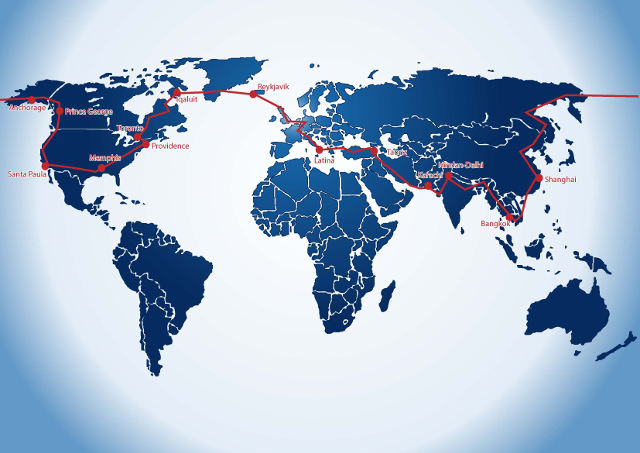 When you are about to take a flight, do you ever wonder who is the conductor of the orchestra of people necessary for a flight to take off properly? Here is a bit more about this unknown yet vital hero.
When you are about to take a flight, do you ever wonder who is the conductor of the orchestra of people necessary for a flight to take off properly? Here is a bit more about this unknown yet vital hero.
A basic description of a flight coordinator is this: he or she prepares, updates, maintains, and provides flight information to flight crews and company personnel. But there is so much more.
A flight coordinator assists in coordinating the day-to-day flight operations in accordance with all federal air regulations and different companies’ aviation operations requirements. He or she actively participates in implementing company safety policy and departmental standards and procedures. At the same time, this person must brief flight crews on all aspects of flights, be it weather reports, charts and forecasts, alternate routes or emergency airports. The flight coordinator also actively follows flights from departure to arrival, monitoring weather, and communicates advisories to flight crews as necessary.
Other responsibilities belonging to the flight coordinator include handling specific flight crews' requests in a timely and efficient manner, and responding with different options to ensure the crews' needs are met. He or she also has to anticipate and proactively take action to deal with future events, situations, and opportunities. The coordinator must effectively use communication skills and tools to convey timely and accurate information to flight crews, operation management, flight operations personnel and others as needed to produce safe, efficient and timely flight planning services. This person must also work effectively with internal and external customers, as well as with peers and management, to provide safe and efficient airlift support services to flight crews and customers.
Successful flight coordinators proactively understand the customers’ needs and take the initiative to ensure those needs are met. He or she also assists in maintaining flight logs, flights record or operational files. They maintain knowledge of crewmember and aircraft locations, help to facilitate and communicate crew logistical arrangements, even identify ways to integrate process improvement opportunities to management in a timely fashion, and safeguard classified materials.
The Flight Coordinator in action
The above could be considered as a general job description for a flight coordinator. Now here are a couple of concrete examples of what a flight coordinator can experience in a given day.
In a normal day-to-day operation, a client with a private jet lands on the airfield and goes to a meeting in town. While he is away, the ground crew detect an anomaly on one of the jet’s engines. The result is that the plane will not be able to leave in the evening, and the client will not be able to get back the same day. Usually, it is the sales department of the company’s responsibility to provide a replacement. However, this time the flight coordinator takes the initiative to try to find a replacement for the plane.
After checking with the different planes on the roster at the airport, he finds two planes going back on ferry flights to the customer’s destination. The first departs at roughly the same time as his scheduled departure. The second leaves three hours later. The flight coordinator contacts the two planes on the airfield, as well as his manager in order to “get the green light” from him. Finally, he contacts the plane leaving at the customer’s scheduled departure time and makes the arrangements with the crew. When the client turns up in the evening, he takes off with no delays and no hassle, without knowing what went on all day. For this example, the mission was accomplished for the flight coordinator, and it demonstrates a good show of initiative.
The second example involves a normal return flight from the United States back to Europe. During the first leg of the flight, the crew spotted a few anomalies above the Atlantic with the engines that didn’t pose a serious problem. One hour before arrival in Europe, one of the engines cut out. The planes that cross over the Atlantic Ocean have multiple engines, so the loss of one is generally not too much of a concern. However, as a precaution, the crew on board warned the airport of the necessity of having an emergency and fire crew on arrival. Then, due to bad weather, the plane needed an alternate landing field.
Since time is of the essence, the flight coordinator must be in constant contact with the plane, the airport tower and the emergency teams. He takes information from the pilot, determining availability on the ground, and contacts the different operators to find out the alternate landing sites. However, in this case, the alternate landing fields also have inclement weather, so the crew decides to land at is original arrival airport. The plane comes in and just as it lands, the second engines cuts out.
Throughout the entire experience, the crews in contact with the flight coordinator expect a highly professional sense of duty and expertise about the different possibilities. The captain aboard the plane takes the final decision, but they all expect the flight coordinator to find solutions, bearing in mind that the situation on board the plane could change at any moment.
So what does it take?
To join an airline, a private or a military organization, a flight coordinator needs to have a bachelor’s degree, be keen with aeronautics, have a passion about planes and have knowledge about the technical aspect of it. He or she must be quick to react, keep calm under pressure, and know how to find an appropriate solution to all types of situations that can arise.
Technologies, airports and maps change all the time, so a Flight Coordinator has to be up to date. They never have time to get bored, their work is never a routine. The Flight Coordinator's day can change as quickly as the weather.
Photo credit : The Howard Group


 When you are about to take a flight, do you ever wonder who is the conductor of the orchestra of people necessary for a flight to take off properly? Here is a bit more about this unknown yet vital hero.
When you are about to take a flight, do you ever wonder who is the conductor of the orchestra of people necessary for a flight to take off properly? Here is a bit more about this unknown yet vital hero.

J'ai lu d'une traite cet article passionnant et bien écrit. Merci à M. Polidoro et aux flignt coordinators sans lesquels voyager en avion pourrait devenir une vraie galère !